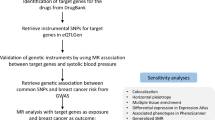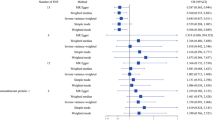Abstract
Case–control studies on the association between XPA A23G and lung cancer have provided either controversial or inconclusive results. To clarify the effect of XPA A23G on the risk of lung cancer, a meta-analysis of all case–control observational studies was performed. Pooled odds ratios (ORs) for various polymorphisms were estimated using random and fixed effects models. The Q-statistic was used to evaluate the homogeneity, and Egger and Begg tests were used to assess publication bias. For the homozygote GG and G allele carriers (GA + GG), the pooled ORs were 1.24 (95% CI 1.05–1.46; P = 0.27 for heterogeneity) and 1.30 (95% CI 1.13–1.51; P = 0.45 for heterogeneity) compared to the homozygous genotype (AA). In the stratified analysis by ethnicity, the ORs of the G allele carriers and the homozygote GG were 1.28 (95% CI 1.10–1.49; P = 0.07 for heterogeneity) and 1.42 (95% CI 1.04–1.93; P = 0.39 for heterogeneity) among non-Caucasians. No significant associations were found in the Caucasian population in any of the genetic models. When studies that were not in Hardy–Weinberg equilibrium (HWE) were corrected, the pattern of the results remained the same. Our results indicated a significantly decreased risk of lung cancer in non-Caucasians with the G allele.
Similar content being viewed by others
References
Molina JR, Yang P, Cassivi SD et al (2008) Non-small cell lung cancer: epidemiology, risk factors, treatment, and survivorship. Mayo Clin Proc 83:584–594
Minna JD, Roth JA, Gazdar AF (2002) Focus on lung cancer. Cancer Cell 1:49–52
Pharoah PD, Dunning A, Ponder BA et al (2004) Association studies for finding cancer-susceptibility genetic variants. Nat Rev Cancer 4:850–860
Doll R, Hill AB (1952) A study of the aetiology of carcinoma of the lung. Br Med J 2(4797):1271–1286
Doll R, Peto R (1976) Mortality in relation to smoking: 20 years’ observations on male British doctors. Br Med J 2(6051):1525–1536
Mattson ME, Pollack ES, Cullen JW (1987) What are the odds that smoking will kill you? Am J Public Health 77(4):425–431
Orlow I, Park BJ, Mujumdar U et al (2008) DNA damage and repair capacity in patients with lung cancer: prediction of multiple primary tumors. J Clin Oncol 26(21):3560–3566
Mohrenweiser H (2007) Survey of polymorphic sequence variation in the immediate 5’ region of human DNA repair genes. Mutat Res 616(1–2):221–226
Xi T, Jones IM, Mohrenweiser HW (2004) Many amino acid substitution variants identified in DNA repair genes during human population screenings are predicted to impact protein function. Genomics 83(6):970–979
Hung RJ, Christiani DC, Risch A et al (2008) International lung cancer consortium: pooled analysis of sequence variants in DNA repair and cell cycle pathways. Cancer Epidemiol Biomarkers Prev 17:3081–3089
Wei Q, Cheng L, Hong WK et al (1996) Reduced DNA repair capacity in lung cancer patients. Cancer Res 56(18):4103–4107
Wu X, Zhao H, Wei Q et al (2003) XPA polymorphism associated with reduced lung cancer risk and a modulating effect on nucleotide excision repair capacity. Carcinogenesis 24(3):505–509
Butkiewicz D, Rusin M, Harris CC et al (2000) Identification of four single nucleotide polymorphisms in DNA repair genes: XPA and XPB (ERCC3) in Polish population. Hum Mutat 15:577–578
Li L, Lu X, Peterson CA, Legerski RJ (1995) An interaction between the DNA repair factor XPA and replication protein A appears essential for nucleotide excision repair. Mol Cell Biol 15:5396–5402
Wakasugim M, Shimizum M, Moriokam H et al (2001) Damaged DNA-binding protein DDB stimulates the excision of cyclobutane pyrimidine dimers in vitro in concert with XPA and replication protein A. J Biol Chem 276:15434–15440
Park JY, Park SH, Choi JE et al (2002) Polymorphisms of the DNA repair gene xeroderma pigmentosum group A and risk of primary lung cancer. Cancer Epidemiol Biomarkers Prev 11(10 Pt 1):993–997
Popanda O, Schattenberg T, Phong CT et al (2004) Specific combinations of DNA repair gene variants and increased risk for non-small cell lung cancer. Carcinogenesis 25(12):2433–2441
Vogel U, Overvad K, Wallin H et al (2005) Combinations of polymorphisms in XPD, XPC and XPA in relation to risk of lung cancer. Cancer Lett 222(1):67–74
DerSimonian R, Laird N (1986) Meta-analysis in clinical trials. Control Clin Trials 7:177–188
Cochran WG (1954) The combination of estimates from different experiments. Biometrics 10:101–129
Egger M, Davey Smith G, Schneider M et al (1997) Bias in metaanalysis detected by a simple, graphical test. Br Med J 315:629–634
Zhu J, Hu Z, Ma H et al (2005) Polymorphism of the DNA repair gene XPA and susceptibility to lung cancer. J Nanjing Med Univ 19(4):173–176
Zienolddiny S, Campa D, Lind H et al (2006) Polymorphisms of DNA repair genes and risk of non-small cell lung cancer. Carcinogenesis 27(3):560–567
De Ruyck K, Szaumkessel M, De Rudder I et al (2007) Polymorphisms in base-excision repair and nucleotide-excision repair genes in relation to lung cancer risk. Mutat Res 631(2):101–110
Raaschou-Nielsen O, Sørensen M, Overvad K et al (2008) Polymorphisms in nucleotide excision repair genes, smoking and intake of fruit and vegetables in relation to lung cancer. Lung Cancer 59(2):171–179
Goode EL, Ulrich CM, Potter JD (2002) Polymorphisms in DNA repair genes and associations with cancer risk. Cancer Epidemiol Biomarkers Prev 11(12):1513–1530
Hirschhorn JN, Lohmueller K, Byrne E (2002) A comprehensive review of genetic association studies. Genet Med 4:45–61
Rodriguez C, Calle EE, Miracle-McMahill HL et al (1997) Family history and risk of fatal prostate cancer. Epidemiology 8:653–659
Author information
Authors and Affiliations
Corresponding author
Additional information
J.-H. Zou, L. An and S. Chen contributed equally to this work and should be considered as co-first authors.
Rights and permissions
About this article
Cite this article
Zou, JH., An, L., Chen, S. et al. XPA A23G polymorphism and lung cancer risk: a meta-analysis. Mol Biol Rep 39, 1435–1440 (2012). https://doi.org/10.1007/s11033-011-0878-z
Received:
Accepted:
Published:
Issue Date:
DOI: https://doi.org/10.1007/s11033-011-0878-z




